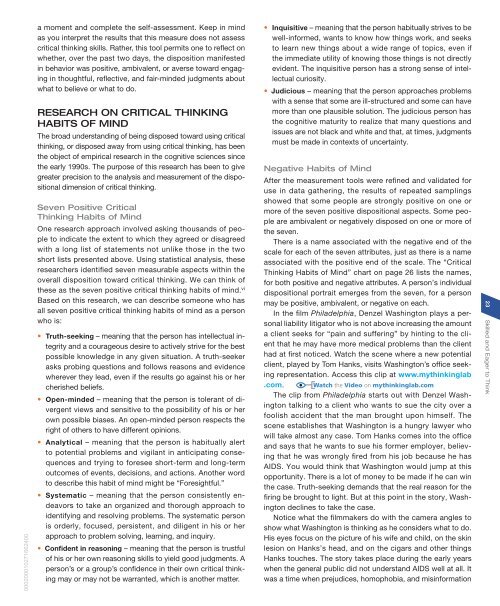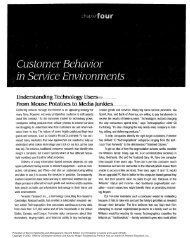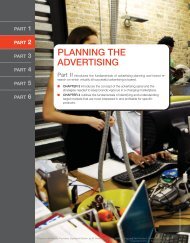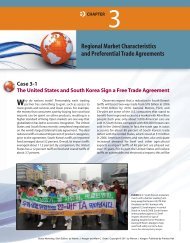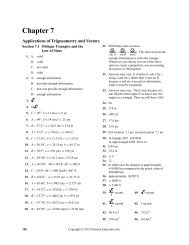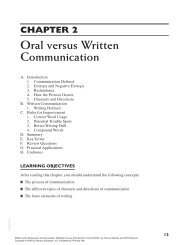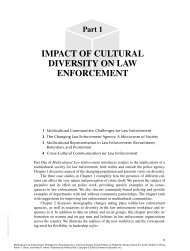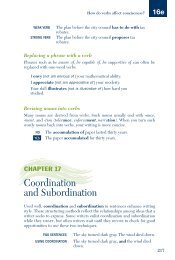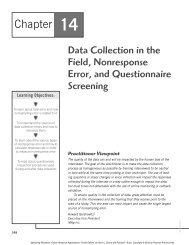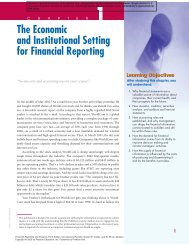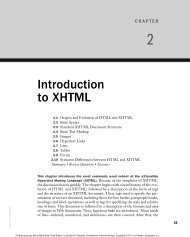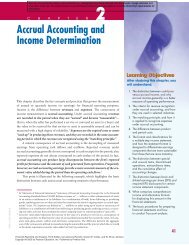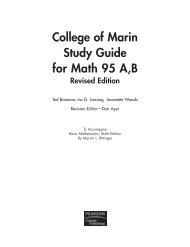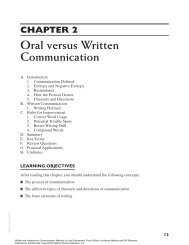Critical Thinking Disposition Self- Rating Form. - Pearson Learning ...
Critical Thinking Disposition Self- Rating Form. - Pearson Learning ...
Critical Thinking Disposition Self- Rating Form. - Pearson Learning ...
Create successful ePaper yourself
Turn your PDF publications into a flip-book with our unique Google optimized e-Paper software.
000200010271662400<br />
a moment and complete the self-assessment. Keep in mind<br />
as you interpret the results that this measure does not assess<br />
critical thinking skills. Rather, this tool permits one to reflect on<br />
whether, over the past two days, the disposition manifested<br />
in behavior was positive, ambivalent, or averse toward engaging<br />
in thoughtful, reflective, and fair-minded judgments about<br />
what to believe or what to do.<br />
RESEARCH ON CRITICAL THINKING<br />
HABITS OF MIND<br />
The broad understanding of being disposed toward using critical<br />
thinking, or disposed away from using critical thinking, has been<br />
the object of empirical research in the cognitive sciences since<br />
the early 1990s. The purpose of this research has been to give<br />
greater precision to the analysis and measurement of the dispositional<br />
dimension of critical thinking.<br />
Seven Positive <strong>Critical</strong><br />
<strong>Thinking</strong> Habits of Mind<br />
One research approach involved asking thousands of people<br />
to indicate the extent to which they agreed or disagreed<br />
with a long list of statements not unlike those in the two<br />
short lists presented above. Using statistical analysis, these<br />
researchers identified seven measurable aspects within the<br />
overall disposition toward critical thinking. We can think of<br />
these as the seven positive critical thinking habits of mind. vi<br />
Based on this research, we can describe someone who has<br />
all seven positive critical thinking habits of mind as a person<br />
who is:<br />
• Truth-seeking – meaning that the person has intellectual integrity<br />
and a courageous desire to actively strive for the best<br />
possible knowledge in any given situation. A truth-seeker<br />
asks probing questions and follows reasons and evidence<br />
wherever they lead, even if the results go against his or her<br />
cherished beliefs.<br />
• Open-minded – meaning that the person is tolerant of divergent<br />
views and sensitive to the possibility of his or her<br />
own possible biases. An open-minded person respects the<br />
right of others to have different opinions.<br />
• Analytical – meaning that the person is habitually alert<br />
to potential problems and vigilant in anticipating consequences<br />
and trying to foresee short-term and long-term<br />
outcomes of events, decisions, and actions. Another word<br />
to describe this habit of mind might be “Foresightful.”<br />
• Systematic – meaning that the person consistently endeavors<br />
to take an organized and thorough approach to<br />
identifying and resolving problems. The systematic person<br />
is orderly, focused, persistent, and diligent in his or her<br />
approach to problem solving, learning, and inquiry.<br />
• Confident in reasoning – meaning that the person is trustful<br />
of his or her own reasoning skills to yield good judgments. A<br />
person’s or a group’s confidence in their own critical thinking<br />
may or may not be warranted, which is another matter.<br />
• Inquisitive – meaning that the person habitually strives to be<br />
well-informed, wants to know how things work, and seeks<br />
to learn new things about a wide range of topics, even if<br />
the immediate utility of knowing those things is not directly<br />
evident. The inquisitive person has a strong sense of intellectual<br />
curiosity.<br />
• Judicious – meaning that the person approaches problems<br />
with a sense that some are ill-structured and some can have<br />
more than one plausible solution. The judicious person has<br />
the cognitive maturity to realize that many questions and<br />
issues are not black and white and that, at times, judgments<br />
must be made in contexts of uncertainty.<br />
Negative Habits of Mind<br />
After the measurement tools were refined and validated for<br />
use in data gathering, the results of repeated samplings<br />
showed that some people are strongly positive on one or<br />
more of the seven positive dispositional aspects. Some people<br />
are ambivalent or negatively disposed on one or more of<br />
the seven.<br />
There is a name associated with the negative end of the<br />
scale for each of the seven attributes, just as there is a name<br />
associated with the positive end of the scale. The “<strong>Critical</strong><br />
<strong>Thinking</strong> Habits of Mind” chart on page 26 lists the names,<br />
for both positive and negative attributes. A person’s individual<br />
dispositional portrait emerges from the seven, for a person<br />
may be positive, ambivalent, or negative on each.<br />
In the film Philadelphia, Denzel Washington plays a personal<br />
liability litigator who is not above increasing the amount<br />
a client seeks for “pain and suffering” by hinting to the client<br />
that he may have more medical problems than the client<br />
had at first noticed. Watch the scene where a new potential<br />
client, played by Tom Hanks, visits Washington’s office seeking<br />
representation. Access this clip at www.mythinkinglab<br />
.com. Watch the Video on mythinkinglab.com<br />
The clip from Philadelphia starts out with Denzel Washington<br />
talking to a client who wants to sue the city over a<br />
foolish accident that the man brought upon himself. The<br />
scene establishes that Washington is a hungry lawyer who<br />
will take almost any case. Tom Hanks comes into the office<br />
and says that he wants to sue his former employer, believing<br />
that he was wrongly fired from his job because he has<br />
AIDS. You would think that Washington would jump at this<br />
opportunity. There is a lot of money to be made if he can win<br />
the case. Truth-seeking demands that the real reason for the<br />
firing be brought to light. But at this point in the story, Washington<br />
declines to take the case.<br />
Notice what the filmmakers do with the camera angles to<br />
show what Washington is thinking as he considers what to do.<br />
His eyes focus on the picture of his wife and child, on the skin<br />
lesion on Hanks’s head, and on the cigars and other things<br />
Hanks touches. The story takes place during the early years<br />
when the general public did not understand AIDS well at all. It<br />
was a time when prejudices, homophobia, and misinformation<br />
23<br />
Skilled and Eager to Think<br />
Think <strong>Critical</strong>ly, by Peter Facione and Carol Ann Gittens. Published by Prentice Hall. Copyright © 2013 by <strong>Pearson</strong> Education, Inc.


